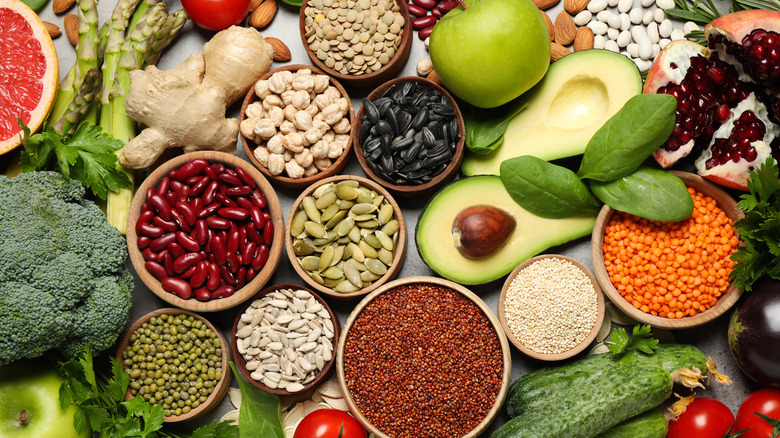Why Some Doctors Warn Against The Raw Food Diet
The raw food diet became popular in the 90s when big celebrities like Woody Harrelson and Demi Moore announced that they follow the diet, per Encyclopedia. As we entered the early 2000s, the diet became so popular that entire restaurants began opening that were tailored directly to the fad. But while the raw food diet may seem like a trend, it has actually been around since the 1800s. According to Today's Dietician, the raw food diet was created by a man named Maximilian Oskar Bircher-Benner who noticed that eating raw apples helped cure his jaundice. He went on to experiment with raw foods, eventually opening a clinic dedicated to the diet.
At its core, the raw food diet is when one eats only raw (nothing heated over 104 to 118 degrees fahrenheit) or unprocessed foods, per Healthline. The majority of the diet consists of nuts, seeds, fruits, and vegetables. Some choose to include raw eggs and dairy and a smaller majority also consume raw meat and fish. And while many people have hopped on the raw food trend, is it really healthy for you?
The raw food diet has pros and cons
According to Healthline, true supporters of the raw food diet believe that cooking our food is detrimental to our overall health because it destroys natural enzymes causing food to be less nutritious. But, this is not a medical claim and research has proved that both cooked and raw food are equally as healthy.
Still, those who follow the raw food diet swear by its benefits, which they say include increased energy, weight loss, help with chronic illnesses, higher vitality, and overall wellness. Medical News Today says that the main components of a raw food diet include raw fruits and vegetables, fresh fruit and juices, nut and coconut milk, raw nut butter, raw seeds, seaweed, nutritional yeast, sprouted beans and grains, wheatgrass, and fermented food like kimchi and sauerkraut. Some dieters also add raw eggs, sushi and sashimi, and dried meat to their menu. And while this sounds healthy, there are a lot of risk factors that coincide with consuming an all-raw diet.
Why your doctor may advise you to steer clear of the raw food diet
If you aren't a big meat eater and enjoy blending your own juices and keeping your diet clean, the raw food diet may be a big draw for you. Eating raw foods has been shown to help fight diseases and can lead to higher energy levels, clearer skin, and better digestion (via Medical News Today). But while the raw food diet may have its benefits, some doctors are weary about how this diet can affect you.
According to WebMD, following this diet can lead to a lack of important nutrients including B12, iron, and calcium, which are all essential to our health. And while registered dietitian Maxine Smith, RD, LD told The Cleveland Clinic that we can all benefit from some aspects of the raw diet, specifically adding more fruits and vegetables to our plates, the health risks may outweigh those benefits. In addition to the nutrient deficiencies, a raw food diet can be dangerous, especially when raw meat and milk are included as it can lead to disease. If you are interested in the raw food diet, Smith recommends using it as a short-term plan to help you start eating better foods every day, but to avoid using it as a long-term diet.


